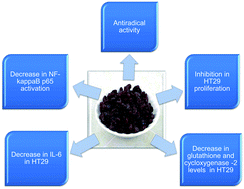Colorectal cancer is one of the major causes of cancer-related mortalities in humans across the world. The disease is one influenced by several factors including diet, environment and smoking. Previous studies into the effects of diet on this disease have indicated an inverse relationship between consumption of fruits and vegetables and the risk of developing colon cancer.

The authors attribute the beneficial properties of the raisins and sultanas from this region to their high phenolic content.
This article is free to access until the 4th February 2013!
Chemopreventive properties of raisins originating from Greece in colon cancer cells, Aggeliki M. Kountouri, Aristea Gioxari, Evangelia Karvela, Andriana C. Kaliora, Michalis Karvelas and Vaios T. Karathanos, Food Funct., 2013, DOI: 10.1039/C2FO30259D
You can keep up to date with the latest developments from Food & Function by signing up for free table of contents alerts and monthly e-newsletters.










